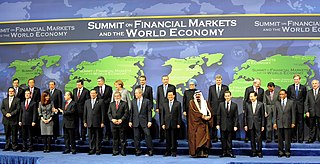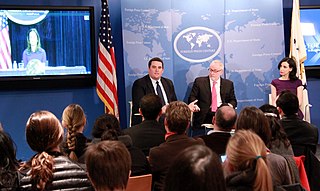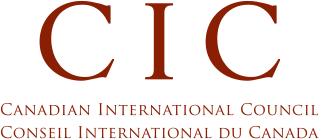
A think tank, or policy institute, is a research institute that performs research and advocacy concerning topics such as social policy, political strategy, economics, military, technology, and culture. Most think tanks are non-governmental organizations, but some are semi-autonomous agencies within government, and some are associated with particular political parties, businesses or the military. Think tanks are often funded by individual donations, with many also accepting government grants.

International relations (IR) are the interactions among sovereign states. The scientific study of those interactions is also referred to as international studies, international politics, or international affairs. In a broader sense, the study of IR, in addition to multilateral relations, concerns all activities among states—such as war, diplomacy, trade, and foreign policy—as well as relations with and among other international actors, such as intergovernmental organizations (IGOs), international nongovernmental organizations (INGOs), international legal bodies, and multinational corporations (MNCs). There are several schools of thought within IR, of which the most prominent are realism, liberalism, and constructivism.
Global Affairs Canada is the department of the Government of Canada that manages Canada's diplomatic and consular relations, promotes Canadian international trade, and leads Canada's international development and humanitarian assistance. It is also responsible for maintaining Canadian government offices abroad with diplomatic and consular status on behalf of all government departments.
Global means of or referring to a globe and may also refer to:

The foreign relations of Canada are Canada's relations with other governments and nations. Canada is recognized as a middle power for its role in global affairs with a tendency to pursue multilateral and international solutions. Canada is known for its strong commitment to international peace and security, as well as being a mediator in conflicts, and for providing aid to developing countries. The "golden age of Canadian diplomacy" refers to a period in Canadian history, typically considered to be the mid-20th century, when Canada experienced a high level of success in its foreign relations and diplomatic efforts. The Canadian Security Intelligence Service (CSIS) is tasked with gathering and analyzing intelligence to prevent threats such as terrorism, espionage, and foreign interference, while the Communications Security Establishment (CSE) is focused on cyber security and protecting Canada's digital infrastructure.

A middle power is a state that is not a superpower or a great power, but still exerts influence and plays a significant role in international relations. These countries often possess certain capabilities, such as strong economies, advanced technologies, and diplomatic influence, that allow them to have a voice in global affairs. Middle powers are typically seen as bridge-builders between larger powers, using their diplomatic skills to mediate conflicts and promote cooperation on international issues.

The Royal Institute of International Affairs, commonly known as Chatham House, is a British think tank based in London, England. Its stated mission is "to help governments and societies build a sustainably secure, prosperous, and just world". It is the originator of the Chatham House Rule.

Transatlantic relations refer to the historic, cultural, political, economic and social relations between countries on both side of the Atlantic Ocean. Sometimes it specifically means relationships between the Anglophone North American countries, and particular European countries or organizations, although other meanings are possible.

Moscow State Institute of International Relations (MGIMO) is an institute of higher education located in Moscow, Russia. The institute is run by the Russian Ministry of Foreign Affairs. MGIMO is considered one of the most prestigious and elite universities in Russia.
A Master in International Affairs (MIA), Master in Global Affairs (MGA), Master of Arts in International Relations (MAIR), Master of International Policy and Practice (MIPP), or Master of Science in Foreign Service (MSFS) is a professional master's degree in international affairs.

Digital diplomacy, also referred to as Digiplomacy and eDiplomacy, has been defined as the use of the Internet and new information communication technologies to help achieve diplomatic objectives. However, other definitions have also been proposed. The definition focuses on the interplay between internet and diplomacy, ranging from Internet driven-changes in the environment in which diplomacy is conducted to the emergence of new topics on diplomatic agendas such as cybersecurity, privacy and more, along with the use of internet tools to practice diplomacy.

The Graduate Institute of International and Development Studies, also known as the Geneva Graduate Institute, is a public-private graduate-level university located in Geneva, Switzerland.

The Canadian International Council is a Canadian think tank on foreign relations. It is an independent, member-based council established to strengthen Canada's role in international affairs. Its goal is to advance debate on international issues across academic disciplines, policy areas, and economic sectors.
The Lakshman Kadirgamar Institute of International Relations and Strategic Studies (LKI) is a foreign policy think tank currently based in Colombo, Sri Lanka. The Minister of Foreign Affairs of Sri Lanka is ex officio the Chairman of LKI. LKI conducts independent research and functions as an autonomous organisation. LKI was established in 2006 and is named after the late Sri Lankabhimanya Lakshman Kadirgamar, PC, MP, and former Sri Lankan Foreign Minister. The Institute is the realisation of a goal actively pursued by the late Minister, to fulfill the country's need for a think tank in the field of foreign policy research and engagement. Its stated mission is 'to engage in independent research of Sri Lanka’s international relations and strategic interests, and to provide insights and recommendations that advance justice, peace, prosperity and sustainability.'
Randolph Bruce Mank is a global business executive and a three-time former Canadian ambassador. He founded MankGlobal Inc. consultancy in 2015.

The Balsillie School of International Affairs (BSIA) is a centre for advanced research and teaching on global governance and international public policy, located in Waterloo, Ontario. As one of the largest social sciences initiatives in Canada, the school is a collaborative partnership between the University of Waterloo, Wilfrid Laurier University, and the Centre for International Governance Innovation. The BSIA is an affiliate member of the Association of Professional Schools of International Affairs, a group of schools that educate leaders in international affairs. The BSIA is housed in the north and west wings of the CIGI Campus. Admission to BSIA is highly selective.
The Frederick S. Pardee School of Global Studies is the international relations and public policy school of Boston University. It was officially established in 2014 by consolidating and renaming a number of long-established programs in international and regional studies at Boston University dating back to 1953. The current dean of the Pardee School is Scott D. Taylor, an American scholar of African politics and political economy, with a particular focus on business-state relations, private sector development, governance, and political and economic reform. The Pardee School has nearly 1,000 students, including about 800 undergraduate students. It offers six graduate degrees, two graduate certificates, five undergraduate majors, and seven undergraduate minors, and also brings together seven centers and programs of regional and thematic studies.










